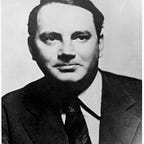Boardinghouse Guest: Educator, Explorer, and Trafficker
Readers may find some of the facts in this story disturbing.
Listed in the guest register at the Old Kentucky Home boardinghouse for September 1923 are Mr. and Mrs. S. P. Verner of Brevard, NC. Twenty-five years earlier, Verner had become well known as an American missionary, anthropologist, and explorer. By 1923, his explorer days were done. He was teaching in a rural school in nearby Transylvania County. He later served as Superintendent of Schools in that county between 1929 and 1931. The 1940 Census lists his occupation as an author. So, Thomas Wolfe was not the first author to stay in the boardinghouse. An aspiring playwright, Thomas Wolfe was not yet published in 1923. Verner coauthored his first book about 1900, African Pygmies. In 1903 he published Pioneering in Central Africa. Julia Wolfe might have remembered Verner’s connection to the 1904 World’s Fair at St. Louis.
Samuel Phillips Verner, born in Oconee County, SC in 1873, graduated at the top of his class from the University of South Carolina in 1892. One biography suggests soon after graduation, he suffered a breakdown leading him to relocate to Tuscaloosa, AL. At Tuscaloosa, his uncle was superintendent at Stillman Institute, a private Presbyterian college, training African American men for the ministry. Verner periodically taught classes there over the course of the next ten years. Inspired by the 1857 work of David Livingstone, Missionary Travels and Researches in South Africa, in 1895 Verner prepared to go to Africa. He was ordained by the Southern Presbyterian Church to serve as a missionary. Verner stayed in the Congo region for the next several years and studied the Tshiluba language. He self-published a book in 1899 written in Tshiluba. One surviving copy is known to be housed at the Smithsonian Institute. By the end of his first exploration in Africa, he had resigned from missionary work. He returned to Tuscaloosa and married Hattie Bradshaw in 1899. In the 1900 Census, he is listed as a patient at the Sheppard and Enoch Pratt Hospital at Baltimore City, possibly suffering from Malaria.
Now, Verner’s interest in Africa had changed. He turned his attention to commercial opportunities. He traveled back to Africa three more times between 1900 and 1908. He was employed as general manager of the American Congo Company to lead expeditions for businessmen wishing to exploit the natural resources of the region. He brought back artifacts for the Smithsonian and traded in wild animals which he sold to American zoos. Disturbingly, he is probably best remembered for transporting numerous pygmy tribesmen from Africa to become human spectacles for the University of Man exhibit at the 1904 St. Louis World’s Fair. Sadly, human zoos, also known as ethnological expositions, had become a part of western culture much earlier than the 1904 World’s Fair. After being displayed at the Fair, a Mbuti man named Ota Benga became a traveling exhibit for Verner’s lectures, and then a human spectacle at the Bronx Zoo until 1906. Verner told different stories about how he had met Benga. He claimed that Benga was a free man. Verner said he had not been bought in Africa nor had he sold Benga to the zoo. African American newspapers around the nation published editorials strongly opposing Benga’s treatment. The Mayor of New York City, pressured by clergymen in New York, finally arranged his release from the zoo to an orphan asylum in Brooklyn. In 1910, Benga relocated to a school in Lynchburg, VA, and eventually went to work in a tobacco factory. Unable to return to Africa in part due to WWI, he died by suicide in 1916.
From 1907 to 1909 Verner lived in Columbia, SC. He continued writing scientific articles and traveling the country as a popular lecturer. His days as an explorer were not yet over. With a wife and four children to support, he went to work for the US Government in Panama from 1910 to 1919 as a sanitation inspector. During WWI he became a censor for the US Mail in the Panama Canal Zone. From his home at Cristobal, Panama he had the opportunity to investigate the jungles of Central America. In poor health in 1920, Verner moved to Brevard, NC where his mother owned a summer vacation home. As an educator, for the next twenty years, he continued to travel and lecture in the US sharing his past adventures in Africa and Central America. A frequent guest in Asheville, Verner died in Asheville on October 9, 1943. He was interred at the Davidson River Cemetery near the Pisgah National Forest.
Read more about Samuel Verner and Ota Benga:
https://www.smithsonianmag.com/science-nature/the-tragic-tale-of-the-pygmy-in-the-zoo-1-180948043/
https://www.npr.org/templates/story/story.php?storyId=6225825
